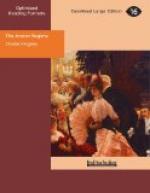Of course. What more exasperating and inexpiable insult to the ruling powers was possible than this? To persist in being needy and wretched, when a whole bureaucracy is toiling day and night to make them prosperous and happy? An insult only to be avenged in blood. Remark meanwhile, that this centralised bureaucracy was a failure; that after all the trouble taken to govern these masses, they were not governed, in the sense of being made better, and not worse. The truth is, that no centralised bureaucracy, or so-called “paternal government,” yet invented on earth, has been anything but a failure, or is it like to be anything else: because it is founded on an error; because it regards and treats men as that which they are not, as things; and not as that which they are, as persons. If the bureaucracy were a mere Briareus giant, with a hundred hands, helping the weak throughout the length and breadth of the empire, the system might be at least tolerable. But what if the Government were not a Briareus with a hundred hands, but a Hydra with a hundred heads and mouths, each far more intent on helping itself than on helping the people? What if sub-delegates and other officials, holding office at the will of the intendant, had to live, and even provide against a rainy day? What if intendants, holding office at the will of the Comptroller-General, had to do more than live, and found it prudent to realise as large a fortune as possible, not only against disgrace, but against success, and the dignity fit for a new member of the Noblesse de la Robe? Would not the system, then, soon become intolerable? Would there not be evil times for the masses, till they became something more than masses?
It is an ugly name, that of “The Masses,” for the great majority of human beings in a nation. He who uses it speaks of them not as human beings, but as things; and as things not bound together in one living body, but lying in a fortuitous heap. A swarm of ants is not a mass. It has a polity and a unity. Not the ants but the fir-needles and sticks, of which the ants have piled their nest, are a mass.
The term, I believe, was invented during the Ancien Regime. Whether it was or not, it expresses very accurately the life of the many in those days. No one would speak, if he wished to speak exactly, of the masses of the United States; for there every man is, or is presumed to be, a personage; with his own independence, his own activities, his own rights and duties. No one, I believe, would have talked of the masses in the old feudal times; for then each individual was someone’s man, bound to his master by ties of mutual service, just or unjust, honourable or base, but still giving him a personality of duties and rights, and dividing him from his class.




